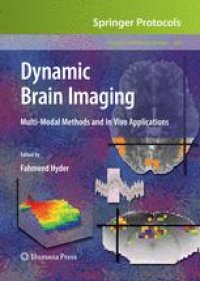
Ebook: Dynamic Brain Imaging: Multi-Modal Methods and In Vivo Applications
- Tags: Neurosciences, Neurochemistry, Diagnostic Radiology
- Series: METHODS IN MOLECULAR BIOLOGY 489
- Year: 2009
- Publisher: Humana Press
- Edition: 1
- Language: English
- pdf
The developing of in vivo neuroscience techniques is rapidly improving the specificity and sensitivity of measurements of brain function. However, despite improvements in individual methods, it is becoming increasingly clear that the most effective research approaches will be multi-modal. Thus, it is the researchers who are familiar with many in vivo techniques who will be able to make the most substantial contributions to our understanding of dynamic brain function.
In Dynamic Brain Imaging: Multi-Modal Methods and In Vivo Applications, leading experts specializing in magnetic resonance, electrophysiology, and optical imaging methods explain basic principles of their respective techniques and demonstrate their power in depicting functional activation patterns en route to a basic understanding of the dynamic processes underlying various neuroimaging signals. The novel results, from various species, provide a new understanding of dynamics of neural activity that span a wide spatiotemporal range. Numerous cutting-edge applications are used as examples to illustrate enticing possibilities of combining techniques toward studies of normal function and disease. Exclusive examples of dynamic functional imaging of the cerebral cortex, olfactory bulb, and retina are used to demonstrate the effectiveness of each method for applications to the neurosciences. State-of-the-art techniques described include multi-photon optical imaging, multi-array electrical recordings, heteronuclear magnetic resonance spectroscopy and functional magnetic resonance imaging.
Up-to-date and user-friendly, Dynamic Brain Imaging: Multi-Modal Methods and In Vivo Applications is designed to be accessible to both specialist neurophysiologists and general neuroscientists. It reviews the fundamental, theoretical, and practical principles of magnetic resonance, electrophysiology, and optical methods as applied in the neurosciences and shows how these tools can be used successfully to answer important questions in brain science.